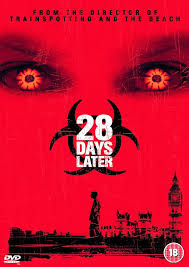Exploring the Impact of 28 Days Later on the Zombie Genre

Introduction
Released in 2002, “28 Days Later” captured the imagination of audiences and critics alike by revitalizing the zombie genre with its impactful storytelling and visceral horror.
Directed by Danny Boyle and written by Alex Garland, this film is significant not only for its artful direction but also because it introduced a new era of fast-moving zombies, diverging from the traditional slow-paced undead. Its themes of survival, societal collapse, and the consequences of scientific recklessness remain relevant, evoking discussions about pandemics and human behavior even in today’s context.
Plot Summary and Unique Features
Set in a post-apocalyptic London, “28 Days Later” follows the story of Jim, played by Cillian Murphy, who awakens from a coma to find the world overrun by monstrous infected individuals. The narrative explores Jim’s struggle to survive and his discovery of other survivors while navigating a desolate and dangerous landscape.
The film is known for its use of real locations in London, offering a stark and empty vision of the city. It was shot in digital format, which contributed to the raw and gritty look that intensified the horror elements. Boyle’s direction combined with garland’s scripting created a compelling mix of tension and character development, setting a precedent for future horror films.
Cultural Relevance and Influence
“28 Days Later” had a profound influence on the horror genre, paving the way for subsequent films such as “Dawn of the Dead” (2004) and series like “The Walking Dead”. The portrayal of a plague-like outbreak raised awareness regarding the fragility of societal order and human morality when faced with catastrophe, themes echoed in real-world crises such as the COVID-19 pandemic.
The film’s chilling depiction of human nature and isolation serves as a cautionary tale about trust and the instinct for survival. It is also a critique of the consequences of scientific experiments gone awry, placing it within a larger discourse on bioethics.
Conclusion
Over two decades post-release, “28 Days Later” continues to resonate due to its innovative storytelling and relevance to contemporary issues. The film not only redefined the zombie genre but also raised critical questions regarding humanity in the face of disaster. Its legacy endures as a touchstone for filmmakers and a cautionary narrative for audiences, reminding us of the fine line between civilization and chaos. As discussions about public health, societal breakdown, and ethical considerations in science remain pertinent, the lessons from “28 Days Later” will likely continue to inspire and haunt viewers for years to come.







